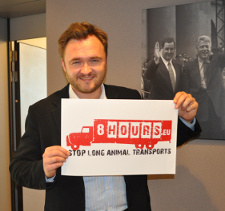The Ministers of Agriculture Christian Schmidt (Germany), Sharon Dijksma (The Netherlands) and Dan Jørgensen (Denmark) – who are responsible for animal welfare in their countries – have signed a Joint Declaration on Animal Welfare, calling on the EU institutions and Member States to improve animal welfare at the European level, through very concrete measures.
The Declaration, signed at the end of a meeting in the Dutch town of Vught, highlights the fact that the three countries are strong agricultural producers, and therefore have a direct interest in the way farming activities are conducted.
They recall that, according to Article 13 of the Treaty on the Functioning of the European Union, animals are sentient beings and for that reason the EU should pay full regard to animal welfare in both the formulation and implementation of EU legislation.
Nevertheless, they see the need for stronger and more concrete action in this area, and among other things they affirm that there is enough scientific evidence to justify a maximum 8-hour transport limit for animals destined for slaughter in the EU. This was the key demand of the 8hours campaign, launched by Danish Minister of Agriculture Dan Jørgensen when he was a Member of the European Parliament. I had the privilege of working closely with Mr Jørgensen at the time, and I am particularly happy to see that the efforts made to promote 8hours were not totally cancelled out by Animals’ Angels’ inexplicable decision to suddenly cut all funds and therefore end the campaign when it was going from strength to strength.
Some other key points of the proposals of the Joint Declaration signed by the three ministers are:
- The need for improvements in communication to consumers;
- A call for the phasing-out of non-therapeutic mutilations in farming activities, such as beak-trimming in chickens, and tail-docking and castration in pigs;
- An invitation to consider establishing specific EU legislation for the protection of farm animals such as turkeys, rabbits, broiler breeders and pullets, and for companion animals (especially dogs and cats). None of these animals are protected by EU legislation yet;
- The proposal to use the EU Common Agricultural Policy and environmental policies to strengthen animal welfare;
- A call to ensure that proposals presently being drafted to simplify EU legislation do not lead to reduced levels of protection for animals in Europe;
- The call to promote animal welfare in the framework of trade agreements, international forums, WTO, FAO, OIE and OECD, among others;
- An acknowledgement of the importance of private standards through the encouragement to all stakeholders to develop voluntary guidelines to improve animal welfare.
This declaration is a milestone in animal welfare, and could become a real turning point in the way animals are treated both in the European Union and worldwide.
In recent years, partly because of the expansion of anti-European parties in some Member States, progress on animal welfare legislation at the EU level has slowed down at critical levels. Hopefully, this will be the starting point for a new wave of concrete European activities aimed at granting all animals much higher levels of protection, thus reflecting the views of the majority of EU citizens.
You can read articles on the Joint Declaration on Animal Welfare on the websites of the Copenhagen Post and 4-Traders.
Free subscription to the AnimalWelfareAndTrade Newsletter: click here
Follow AnimalWelfareAndTrade on Twitter: click here
Follow AnimalWelfareAndTrade on Facebook: click here


